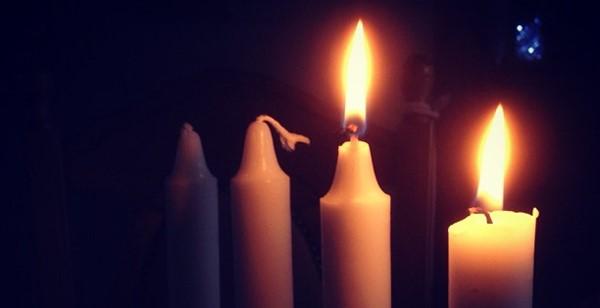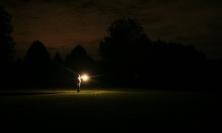Photo shared via Creative Commons (CC BY-SA 2.0)
The need for ‘conversion through remembrance’ about which Pope Francis has spoken recently is also a theme in the readings for the second Sunday of Advent, says Frances Murphy. The texts are rich with promise but demand something of us in return – how do they invite us to respond to God’s offer of consolation, which is always open to us, by confronting our memories and looking to the future?
‘Comfort, O comfort my people, says your God.’[1]
There will be few, if any, Mass-goers (or perhaps this year, Mass-watchers) to whom words of consolation will not be welcome on the second Sunday of Advent 2020. If my colleague Andrew Cameron-Mowat SJ was right to observe that the readings of the day have a ‘theme of reassurance in difficult times’,[2] it is hard to imagine a year in which that would be more needed.
The comfort offered by the Scriptures is not a cheap comfort, though; it is not a wiping clean of the slate of all that has troubled us, nor a panacea that arrives out of the blue. The solace that we can take is rooted in an active conversion, a process that takes full and honest account of where we have come from and uses that to inform our hope of what is to come and our own role within that.
We hear first from Isaiah,[3] who speaks of a way forward, of glory and good tidings. But he does not neglect the past. There have been transgressions, and penalties paid. Jerusalem finds itself on uneven ground that is in need of levelling out. The words of the prophet recognise this, and still affirm that it is on this landscape that the Lord will arrive and this flock that he will gather. It is transformation that is promised, rather than escapism. Is this any surprise, coming as it does from the God who began his conversation with Isaiah saying: ‘Come, let us talk this over. Let us dare to dream’? That is a conversation that God also wants to have with us today, says Pope Francis.[4]
The pope’s own thinking bears this out many times over. He spoke to Austen Ivereigh this spring, in the comparatively early days of the pandemic, about the importance of memory and of a ‘conversion through remembrance’.[5] ‘We need to remember our roots, our tradition which is packed full of memories,’ he said, because it is only through confronting these memories, in the vein of the First Week of the Spiritual Exercises, that we can find our way forward along the path that the Spirit is calling us.
The tension of looking backwards in order to move forwards also finds a place in Fratelli tutti, the pope’s third encyclical, which calls us to human fraternity. Reconciliation has a strong role to play in the vision for the future that the pope articulates: ‘Reparation and reconciliation will give us new life and set us all free from fear.’[6] There is nothing abstract about the reconciliation in which he is calling us to engage. The all-too-concrete horrors that are a stain on the world’s history (and present) are and should be the subjects of our collective remembrance. The Shoah, the atomic bombs on Hiroshima and Nagasaki, persecutions, the slave trade and ethnic violence[7] – these are the features of the wilderness, the wasteland in which the way of the Lord must be prepared:
Nowadays, it is easy to be tempted to turn the page, to say that all these things happened long ago and we should look to the future. For God’s sake, no! We can never move forward without remembering the past; we do not progress without an honest and unclouded memory.[8]
The importance of being attentive to our past, on which the Jesuit pope insists, is the foundation of the practice of the Examen, the Ignatian prayer that invites us to review our recent lives with God so that we might better recognise and act with God in the time to come. Advent, in particular, is a good opportunity to integrate this regular conversation with God into our prayer lives, if it does not already feature.
A fruitful Examen will not just sit in the portion of our day that we allocate to it – its effects will filter into our daily lives and have consequences in our actions. Likewise, in Fratelli tutti, Pope Francis brings the principle of a better future having deep roots in the past to bear on specific issues, one of which is his perennial concern for the plight of migrants. Quoting Querida Amazonia, the apostolic exhortation that followed 2019’s Synod for the Amazon, he affirms:
…it is not a case of implementing welfare programmes from the top down, but rather of undertaking a journey together, through these four actions [welcome, protect, promote and integrate], in order to build cities and countries that, while preserving their respective cultural and religious identity, are open to differences and know how to promote them in the spirit of human fraternity.[9]
Once again, a better world is not brought about by the wave of a wand that vanquishes history and experience in order to start anew, but rather by a careful consideration of concrete realities so that what is good in them can be preserved and lessons can be learned from what needs changing.
Our second reading for this second Sunday of Advent might at first sight seem to obscure this point, with its proclamation that the elements of the earth will be ‘dissolved by fire’.[10] This Second Letter of Peter was written to early Christians in order to sustain them in the face of challenges from those who poured scorn on their faith and to affirm that they were not waiting in vain for the coming again of the Lord, which would be every bit as transformative as they imagined. But this awaited transformation is not a license to live lawlessly, quite the opposite: ‘strive to be found by him at peace, without spot or blemish’; and, were we to hear the next verse, ‘regard the patience of our Lord as salvation.’[11] How we live now, matters; the circumstances of our lives, what we have done and heard and said, the memories that we make – the Lord is living patiently with us through it all. Here is the same appeal to us not to be buoyed along by the trivial calculations of ‘benefits and burdens’ against which Pope Francis cautions, but instead to ground ourselves in and witness to a deeper truth: ‘that each human being is sacred and inviolable’.[12]
And then in the gospel we meet John the Baptist, whose entrance amplifies what we have heard already. The composition of Mark’s introduction to the character is worth pondering: not only is it an instruction to us, too, to ‘Prepare the way of the Lord, make straight his paths’, an echo of the call to right living we heard in our second reading; but it refers to ‘God’s activity at various points in Israel’s history … The lesson behind Mark’s words is that the same God who was active in the past is active now in the story he is about to tell.’[13] This is not the writing of a new story but the continuation of one that is already being told. The baptism that John proclaims is one in which sins are acknowledged, not forgotten. And yet of course John is most clearly a pointer to what is to come. We are not called to dwell in our memories when we confront them, but to identify where we need to repent and be cleansed with the water of John’s baptism, so that we might be open to the call of the Spirit in which we are baptised by the one who is to come.
The comfort that we were promised at the outset is not fully realised without a lot of work on our own part, but it begins with the knowledge that God wants to work with us as we are. We are reminded on this second Sunday of Advent that the Lord is, has always been and will always be waiting to offer us consolation, and that is good news indeed.
Frances Murphy is Editor of Thinking Faith.
[1] Isaiah 40:1 (all Scripture quotations: NRSV).
[2] Andrew Cameron-Mowat SJ, ‘Advent is the Time for Prophecy’, Thinking Faith (3 December 2020): https://www.thinkingfaith.org/articles/20081203_1.htm.
[3] Isaiah 40:1-5,9-11
[4] Pope Francis, Let Us Dream: The Path to a Better Future (Simon & Schuster, 2020), p.7.
[5] Austen Ivereigh, ‘Pope Francis says pandemic can be a “place of conversion”’, The Tablet (8 April 2020): https://www.thetablet.co.uk/features/2/17845/pope-francis-says-pandemic-...
[6] Pope Francis, Fratelli tutti (3 October 2020), §78: http://www.vatican.va/content/francesco/en/encyclicals/documents/papa-francesco_20201003_enciclica-fratelli-tutti.html
[7] Fratelli tutti, §247-8.
[8] Ibid., §249.
[9] Ibid., §129.
[10] 2 Peter 3:8-14.
[11] 2 Peter 3:14-15.
[12] Ibid., §210, 207.
[13] Peter Edmonds SJ, ‘Christmas without the crib? Mark’s Gospel in Advent’, Thinking Faith (5 December 2014): https://www.thinkingfaith.org/articles/christmas-without-crib-mark%E2%80%99s-gospel-advent






